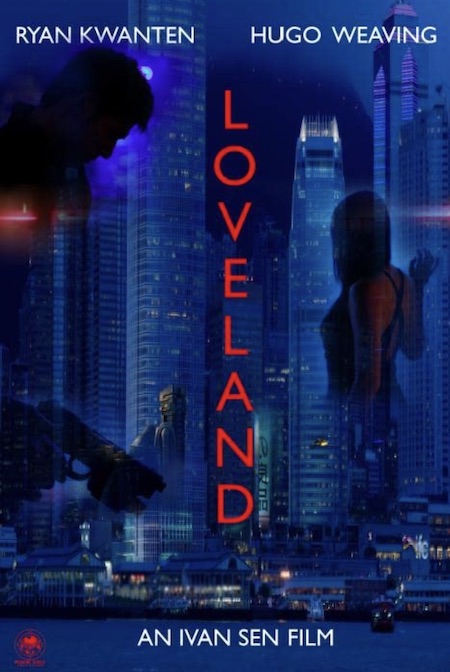

Loveland (Ivan Sen, 2021) aka Expired; wr., music, dp etc., Ivan Sen; prod. David Jowsey, Bunya Productions; Ryan Kwanten, Hugo Weaving, Jillian Nguyen; scifi; shot Hong Kong, Macau, Qld
I recognise nothing in this of the Ivan Sen whose work I have been avidly consuming since the late 1990s.
The story is just another scifi fantasy about the interface between human and machine, life and death, memory and desire, giving rise to the same old ontological and epistemological questions.
The tone is morosely sustained throughout. The unpleasant, insistent 'elegaic' (perhaps) music plays a part, as do the repeated shots of a dense cgi landscape of skyscrapers.
The acting is inconsequential. But a special black mark has to be given to the decision to allow Ryan Kwanten's monologue to be almost completely incomprehensible. Which for a very wordy production is contradictory. If we have to spend most of the film listening to this interminably anguished failure, why are we not permitted to hear what he's talking about? At least it would have passed the time.
I actually dozed off for a few minutes in the middle, and when I revived, thought the film had started over again - but it was just more of the same. Like me, it got its second wind and droned on.
Luke Buckmaster didn't like it either, but put it much better than me:
Sen delivered weighty ponderousness much better in his outback noir Goldstone, another production that takes familiar genre mechanisms and slows them right down. In Loveland, the dialogue and narration is so full on that it becomes almost fourth-wall-breaking in its artifice, pulling the viewer out of the experience by reminding us of the film-making (in particular the writing) process. This unquestionably ambitious film works best as a mood piece: it’s big, bold, cerebral and intensely unsubtle. The Guardian.

... I've now seen this again, and feel exactly the same about it as the first time. I have no idea what Sen was thinking when he made this. It's like a poor man's Blade Runner: a dystopic future, endless moaning electronica, cgi cities with floaty things probably meant to suggest vehicles. And it's also a bit like Fallen Angels, in the crowded streets of Hong Kong, but dreary instead of exciting.
Perhaps he just wanted to show that he could make something other than an "Ivan Sen film" (the archetype being Mystery Road) – but he tried that with Loveland, and apparently felt he's failed, as he's not allowed it to be shown, let alone released. So why he had another go with another -land – only to fail again* – is hard to understand. Fortunately, for the fortunes of the Sen empire, he has since returned to core business, with Limbo, another story based on his (understandable) obsession with the treatment of Aboriginal (and by extension Asian) women by Australian misognynism.
... Since writing all that, I've read Travis Johnson's essay in Metro. He listened much harder than I did, and actually understood everything that I did not – so I recommend you ignore me and read him. While I still think Sen has made it very difficult for an ordinary audience to understand most of what's going on in the film (especially with literally incomprehensible [in both senses] lines, I now recognise a much better film than I did.
Luke Buckmaster, review in The Guardian.
Travis Johnson, review in Metro.
Garry Maddox, ‘Mystery Road and Goldstone Director Ivan Sen’s Most Ambitious Project Yet’, The Sydney Morning Herald, 10 March 2022.
*The film's IMDb score of 3.7 (from 869 respondents) is unusually low.
Garry Gillard | New: 28 April, 2021 | Now: 17 September, 2023